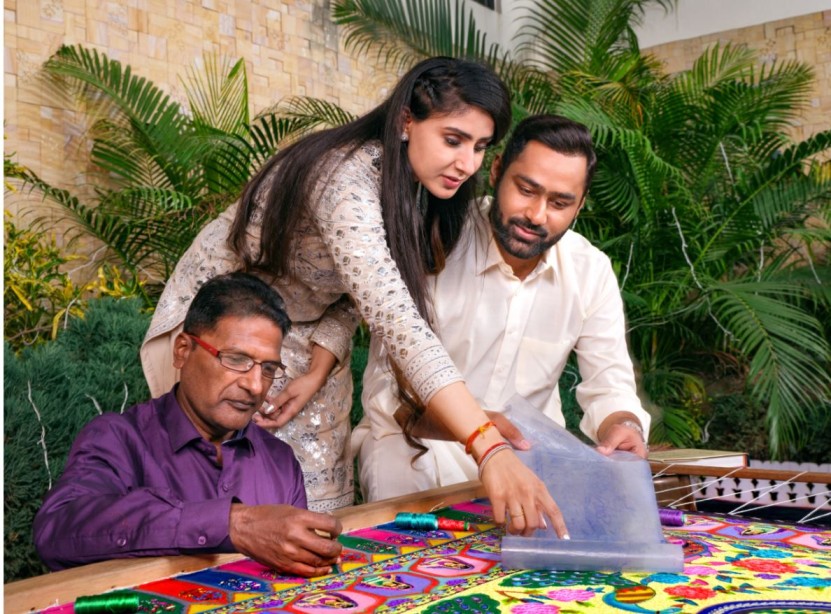This article has been sponsored by Facebook.
“Paris is famous for Pashminas…I didn’t know that. All of these shawls are mostly made in India,” chuckles Pranav Malhotra, managing director of Pashtush, an Amritsar-based business that’s taking Indian luxury shawls to the world.
France is only one of the 120 countries where Pashtush exports its hand-crafted products. The brand of luxury shawls, scarves, and ties for men and women is Pranav’s effort to take forward his family legacy. He hails from one of Amritsar’s oldest shawl manufacturing families, and it was his great-great-grandfather who started as a yarn trader. But it’s Pranav who leveraged digital to expand the business nationally and globally.
Pranav says that as an avid traveller, his trips helped him realise that the West liked oriental products, especially shawls and stoles. But back home, the artisans and weavers weren’t getting their worth, he notes.
Because shawls and stoles are seasonal products, it was tough for artisans and weavers to maintain a steady stream of income. An encounter with a talented weaver selling sugarcane juice on the street is what encouraged Pranav to eliminate middlemen and employ local talent.
“I was driving down to source some threads when I saw one of our very old and talented karigars, who used to work with my dad. I asked him what he was doing selling sugarcane juice on the street. He told me he had lost his income because of the lockdown. That’s when we employed him and others like him,” says the 31-year-old.
Pashtush was conceptualised at the end of 2017 when they came up with their website. It is a coinage of the words ‘Pashmina’ and ‘tush’, which means wool. Each Pashtush shawl is carefully crafted with 30-40 people behind each piece.
“Our shawls are not made under one roof. Their journey begins from when we source the raw wool to make the yarn, and then come to the spinners, dyers, weavers, artisans and sketchers who come up with the designs. And finally, there’s the embroiders. All of this happens across villages in and around Punjab, Kashmir, and Himachal Pradesh, generating income for thousands of families,” he says.
Moreover, it takes five or six months to create one Pashtush shawl. “This is because we encourage the artisans to take their time with them,” he adds.
Earlier, the artisans would lose six months of their earnings. But today, Pranav claims that with Pashtush, they earn 2.5x more. “Say, for instance, an artisan charged INR 10,000 for painting the shawl that was sold for just three months. Now, they can earn through the year,” he says.
‘Bringing 2,000 Products To Life’

“We were looking for people to employ during the lockdown because we had so much demand,” says Pranav.
He adds, “We had doubled our business when the pandemic struck and the last financial year, we grew at a 2.5x rate. This is strictly from online sales, as our offline sales were down.”
Pranav says Meta and its apps have helped move the company from a wholesale model to a direct-to-consumer one. “One post on Facebook results in thousands of inquiries from all over the globe,” he says.
“I could not have done justice to our products without Facebook and Instagram, because they allow you to tell a story. They bring our 2,000 products to life. One photo on Instagram being viewed by people across the world is surreal. The reach as well as the impact these platforms can have to an artist, especially during the lockdown, is phenomenal,” he says.
Thanks to Facebook and Instagram, Pashtush and the artisans behind the brand have a newfound purpose. “To build this community around people who are interested in our products and those who have similar tastes and preferences, while also getting live feedback, would have not been possible in the conventional setup,” he says.
“We realised that WhatsApp is one channel we could use for our customer relationship management, especially during the lockdown. Everyone is on it, even unconventional shoppers like my nani. She is an ardent shopper who doesn’t know how to use a card or browse the internet. Earlier, she would be dependent on someone to order products for her. Now, people like her can click the WhatsApp button and immediately get connected with customer care managers. That is what personalises the shopping experience,” he says.
Today, Pashtush delivers its products to the length and breadth of the country, as well as to Australia, New Zealand, and Latin America, where the winter months coincide with Indian summers. Their markets also include the US, UK, Europe, and the Middle East.
“We are one of the only industries that net exports handicrafts to China. In Hong Kong, we have a product called Kalamkari shawls, which is very popular among wholesalers,” he says.
Speaking about future plans, Pranav says, “We are looking to scale up our digital business. Having established a good business in the US and UK, we will expand to untapped markets like non-English speaking countries. We are looking to develop a Spanish website and a separate Instagram and Facebook account for our Spanish customers.”
(Edited by Divya Sethu)
No comments:
Post a Comment